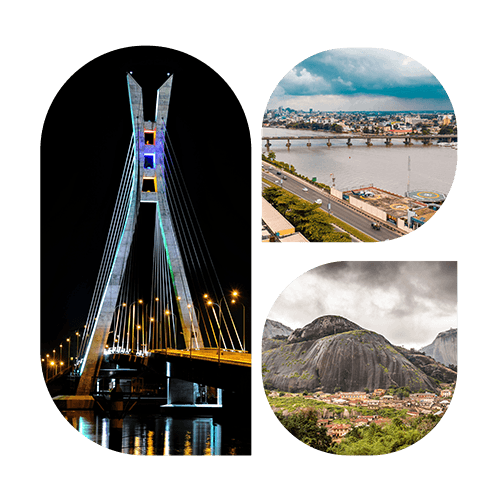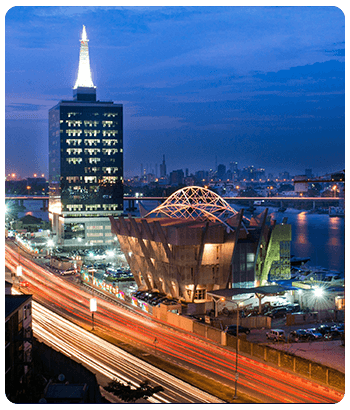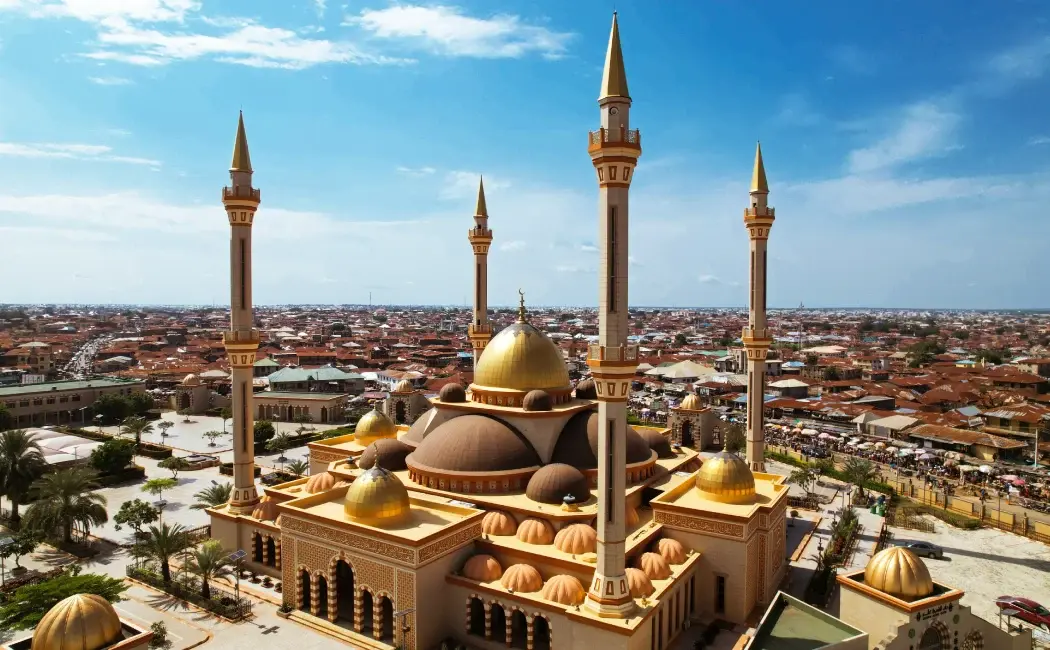

Nigeria stands as Africa's most populous nation and cultural powerhouse, offering visitors an authentic journey through remarkable diversity. From bustling Lagos with its pulsating nightlife and contemporary art scene to ancient walled cities and lush rainforests, Nigeria presents a complex mosaic of over 250 ethnic groups. With its infectious music, bold fashion, celebrated literature, rich traditions, and legendary hospitality, Nigeria delivers an energetic and transformative West African experience.
Nigeria represents West Africa's economic giant with emerging tourism significance, drawing visitors seeking authentic cultural immersion through its diverse ethnic traditions, bustling urban centers, historical sites, and increasingly recognized contemporary arts and music scene.
The country showcases extraordinary cultural diversity through its numerous ethnic groups including the Yoruba, Igbo, and Hausa, each maintaining distinctive traditions visible in colorful festivals, intricate crafts, ancient palaces, and vibrant performing arts traditions.
Nigerian cuisine delights with bold flavors centered around staples like jollof rice, pounded yam with egusi soup, suya grilled meats, and pepper soups, experienced through both vibrant street food scenes and modern restaurants showcasing regional specialties.
Lagos and other major cities offer diverse shopping experiences from traditional markets like Lekki in Lagos to modern malls, with unique treasures including vibrant Ankara fabrics, handcrafted leather goods, distinctive beadwork, and contemporary Nigerian fashion.
Cultural performances feature traditional dance ceremonies, contemporary Afrobeats music that has gained global popularity, dynamic theater productions, and energetic nightlife experiences in Lagos and other major urban centers.
Beach resorts along the Atlantic coastline provide seaside relaxation opportunities, while emerging spas incorporate traditional healing elements, and natural areas like Yankari offer hot springs within wildlife-rich environments.
Beyond cultural exploration, Nigeria offers wildlife experiences in national parks including Yankari and Cross River, hiking opportunities in plateau regions, waterfall excursions, and boat explorations through the Niger Delta's complex ecosystems.
International airports in Lagos, Abuja, and Port Harcourt connect with global hubs, while domestic flights, improving highway networks, and specialized tour operators facilitate travel through Nigeria's diverse regions.
Things to Do: Experience Lagos' contemporary art galleries and music scene, explore ancient walled cities like Kano, witness traditional ceremonies, visit the Osun Sacred Grove, and enjoy coastal relaxation at beaches like Tarkwa Bay.
Pre-trip Planning: Secure visa well in advance, arrange airport transfers through hotels, research cultural etiquette for different regions, and consider connecting with local guides or tour operators for specialized experiences.
Packing Essentials: Include lightweight breathable clothing, modest attire for northern regions and religious sites, insect repellent, portable power bank for occasional electricity fluctuations, and comfortable walking shoes for urban exploration.
Onground Tips: Negotiate taxi fares before riding, carry smaller denominations for markets and street vendors, maintain digital and physical copies of important documents, and embrace the social nature of Nigerian interactions.
Currency & Payment: The Nigerian Naira (NGN) is the local currency with ATMs available in cities; while major hotels and upscale establishments accept credit cards, cash is essential for markets, smaller vendors, and businesses outside urban centers.
Transportation Guidelines: Pre-arranged drivers provide the most comfortable and secure travel option between cities, while rideshare apps offer convenient urban transportation in Lagos and other major cities.
Cultural Respect: Greet elders with appropriate respect, understand that Nigerians generally maintain more modest dress standards, ask permission before photographing people or ceremonies, and appreciate that discussions may include personal questions as expressions of genuine interest.
Food & Dining: Embrace Nigeria's spicy flavor profiles, sample regional specialties beyond jollof rice, expect generous portions at traditional restaurants, and understand that eating with the right hand is customary in more traditional settings.
Health & Safety: Drink bottled water, maintain current vaccinations including yellow fever, use reputable transportation, exercise normal urban safety precautions, and register with your embassy if planning extended travel.
Communication: English is the official language with distinctive Nigerian expressions, while major ethnic groups speak Hausa (north), Yoruba (southwest), and Igbo (southeast); learning basic greetings in the regional language shows cultural respect.
Accommodation Cost: Luxury hotels in Lagos and Abuja range from $150-400+ per night, mid-range options average $80-150, while budget accommodations are available from $30-80 depending on location and amenities.
Activities: Guided city tours typically cost $30-80, cultural performances range from $15-50, museum and site entrance fees average $5-15, and specialized experiences like wildlife excursions run $50-150 depending on duration.
Shopping Tips: Bargaining is expected and part of the cultural experience with initial prices often marked up; take time to establish rapport with vendors, compare quality and prices between shops, and maintain a friendly attitude throughout negotiations.
Personalised Recommendations: Cultural enthusiasts should explore Yorubaland in the southwest, history buffs will appreciate ancient northern cities, nature lovers should consider Yankari and Cross River, while those seeking contemporary culture will enjoy Lagos and Abuja.

Nigeria is full of amazing sights beautiful beaches, busy cities, wild animals, tall rocks, clear waterfalls, sacred forests, old traditions, and colorful festivals. A land of culture, adventure, and natural beauty waits for you.


